Key takeaways:
- Chronic illness brings complex emotional experiences, requiring a balance between honoring one’s body and engaging with life.
- Hospital ministry plays a critical role in providing emotional and spiritual support, bridging medical care with holistic healing.
- Simple acts of kindness and community support, such as prayer groups and heartfelt gestures, can significantly boost hope and resilience in patients.
- Key lessons from the journey include the importance of patience, self-advocacy, and recognizing one’s worth beyond the illness.
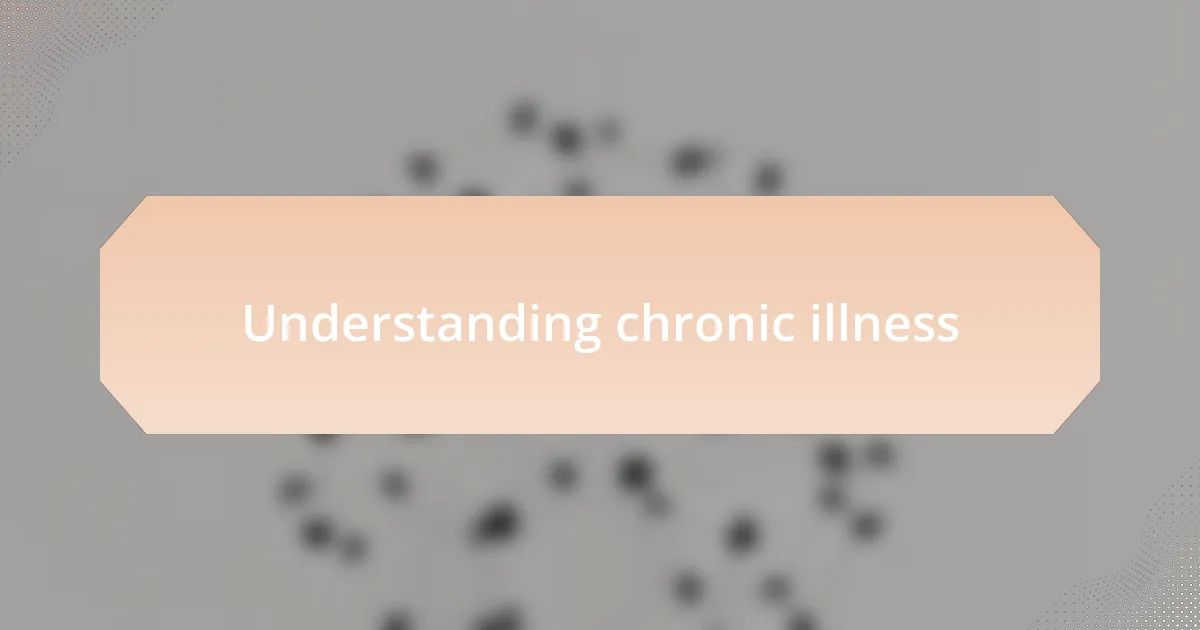
Understanding chronic illness
Chronic illness can feel like a lifelong companion that often alters your daily reality. I remember the moment I realized my fatigue wasn’t just a passing phase; it was a profound shift in how I experienced the world. Have you ever felt that sense of disorientation when your body refuses to cooperate with your mind?
Living with chronic illness means navigating the ebb and flow of symptoms, each day presenting a new challenge. I once had a week where I could barely leave my bed, while another week brought unexpected bursts of energy. It’s a constant balancing act—how do we honor our bodies while still engaging with life?
I often find myself reflecting on the emotional landscape that accompanies chronic illness. There are days filled with frustration and sadness, and others that bring a sense of acceptance. Has this experience shaped your understanding of resilience? For me, it has become a journey of self-discovery, revealing strengths I never knew I had.
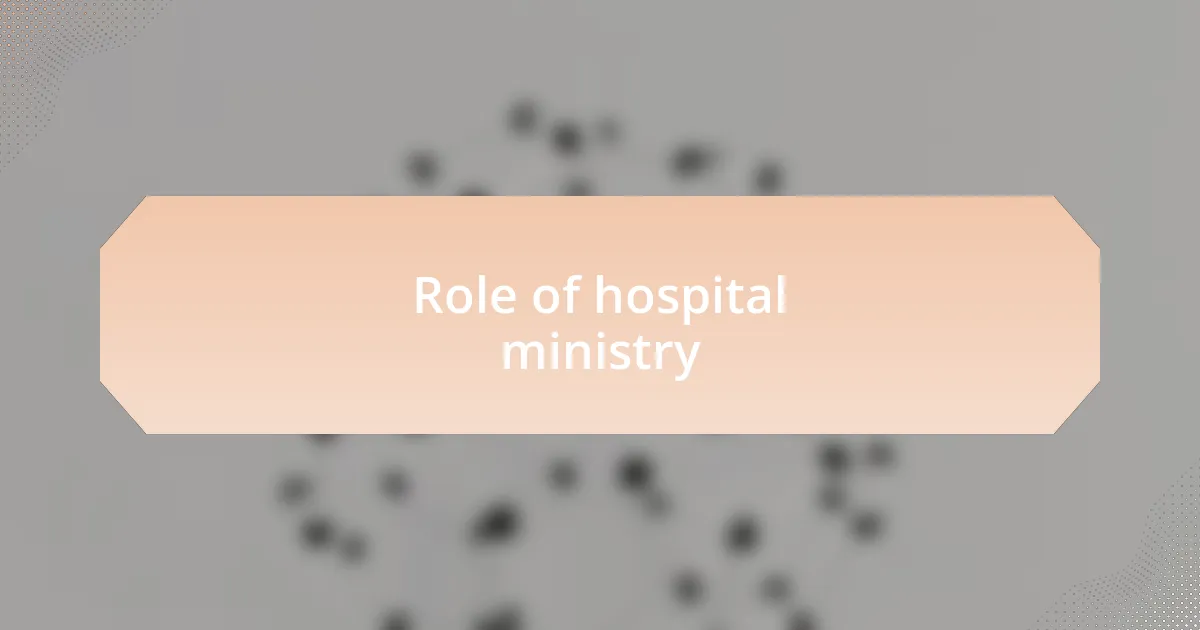
Role of hospital ministry
The role of hospital ministry is crucial in providing both spiritual and emotional support to patients and their families. I vividly recall a time when I was in the hospital, overwhelmed by uncertainty. A hospital chaplain arrived, offering a listening ear and gentle encouragement, reminding me that I wasn’t alone in my struggle.
Ministers often serve as a bridge between medical care and spiritual well-being. They bring a sense of hope through prayer, scripture, or simply a comforting presence. Have you ever wondered how powerful a kind word or a moment of compassion can be during dire times? In my experience, these gestures often provide strength to face the challenges ahead.
Additionally, the ministry plays a vital role in advocating for patients’ needs, ensuring that their emotional and spiritual health is treated alongside their physical health. I’ve witnessed how deeply impactful it is when care teams incorporate spiritual discussions into their assessments. It creates an environment of holistic healing, acknowledging that our well-being encompasses more than just our physical symptoms.

Supporting patients in need
Supporting patients in need is about recognizing that each individual faces a unique battle. I remember a patient who shared her fears with me during a particularly tough visit. Simply being there to hold her hand and affirm her feelings made a significant difference in her day; it reminded me that sometimes, the most profound support comes not from words, but from presence.
Throughout my journey, I’ve learned that emotional reassurance can be just as crucial as medical intervention. Have you ever felt that a simple act of kindness lifted your spirits during a challenging moment? When I received a handwritten note from a hospital volunteer, it reminded me that I was seen and cared for, a small gesture that often felt monumental in the midst of my struggle.
Being proactive in supporting patients means addressing their fears before they become overwhelming. I think of the times I’ve led hospital prayers or small support groups. These gatherings often create a safe space for patients to express their concerns and foster a sense of community. In my experience, it’s evident that fostering these connections helps patients not just to cope, but to thrive despite their circumstances.
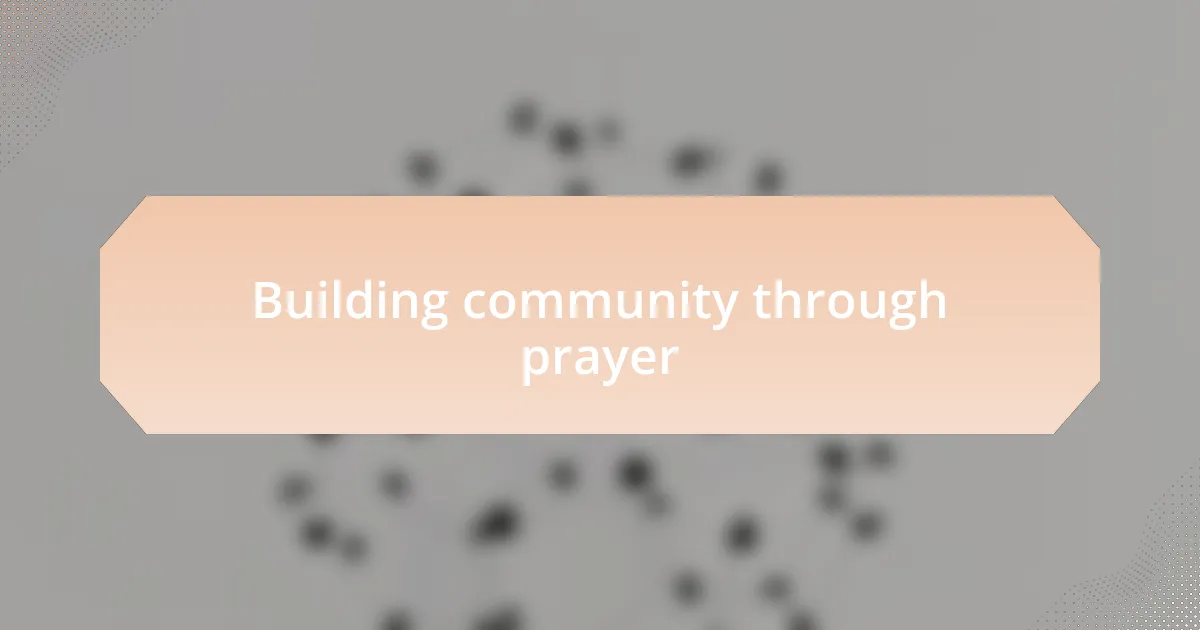
Building community through prayer
Prayer has a unique way of bringing people together, especially in times of distress. I recall attending a prayer circle where individuals from different backgrounds came together, sharing their hopes and fears aloud. It felt incredible to witness strangers find comfort in each other’s presence, united by a common purpose. Have you ever experienced that sense of belonging simply by participating in something greater than yourself?
In my own journey, I found that praying with others transformed my perspective of isolation into one of solidarity. During moments when I struggled with uncertainty, saying a prayer with fellow patients felt like weaving a safety net of support around me. Each prayer was a thread, binding our hearts together and reminding us that we weren’t alone on this path. I often wonder, how many of us could benefit from creating such intentional moments of connection in our lives?
When prayer becomes a shared practice, it deepens our communal bonds, allowing us to uplift one another in ways we might not have imagined. One evening, as I joined others in the chapel for an intention-setting prayer, I felt an overwhelming wave of hope wash over us. It was as though the collective energy breathed life into our struggles, transforming our burdens into shared intentions. Isn’t it remarkable how the act of praying together can ignite that spark of resilience and fortitude within our community?
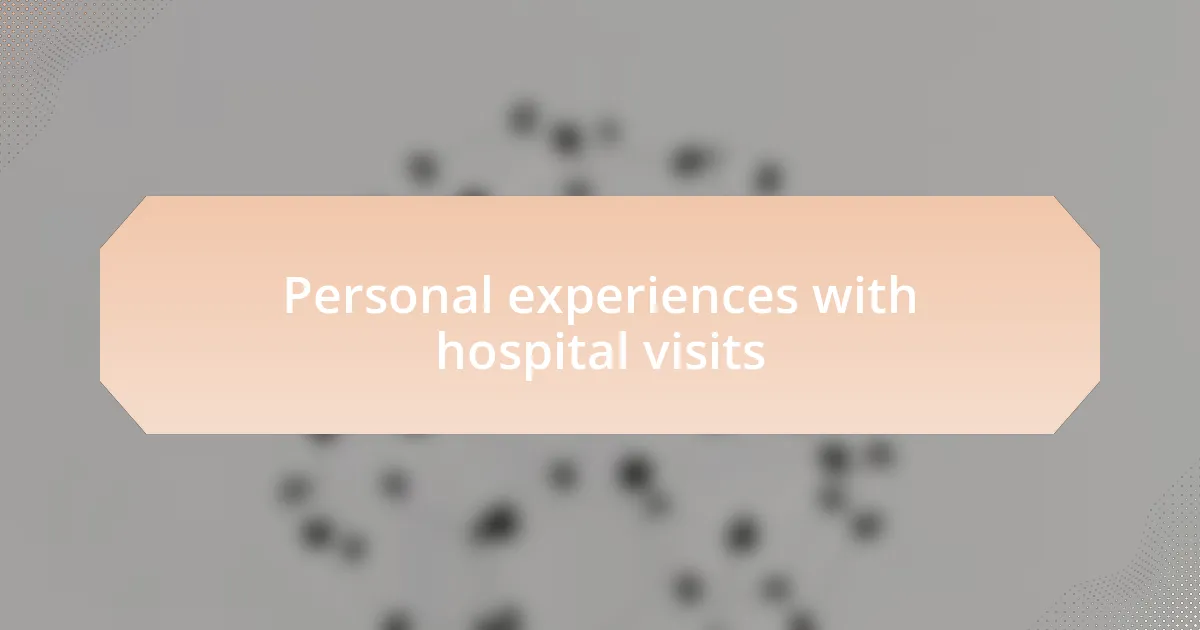
Personal experiences with hospital visits
While navigating my chronic illness, the hospital visits often felt like an emotional rollercoaster. Each entry was marked with a mix of anxiety and hope, where sterile environments clashed with the icy grip of uncertainty. I remember a particular day when the waiting room was suffused with silence, broken only by the occasional beep of machines. Have you ever felt so close to strangers, yet so alone in your fears?
During one visit, as I sat in the examination room, I caught sight of a mother comforting her child. In that moment, I realized the universality of our struggles. It reminded me that behind every patient, there’s a story, a journey filled with dreams and challenges. I found myself reflecting, how often do we acknowledge the shared humanity in hospital visits?
On another occasion, after receiving health news, I stepped outside for some fresh air. The sun felt warm on my face, contrasting sharply with the coldness of the hospital. I sighed deeply, hoping to shake the weight of uncertainty. It struck me then how vital those small moments of connection with the outside world were, almost like tiny lifelines amidst the medical chaos. Isn’t it interesting how nature can provide solace in the most unexpected places?
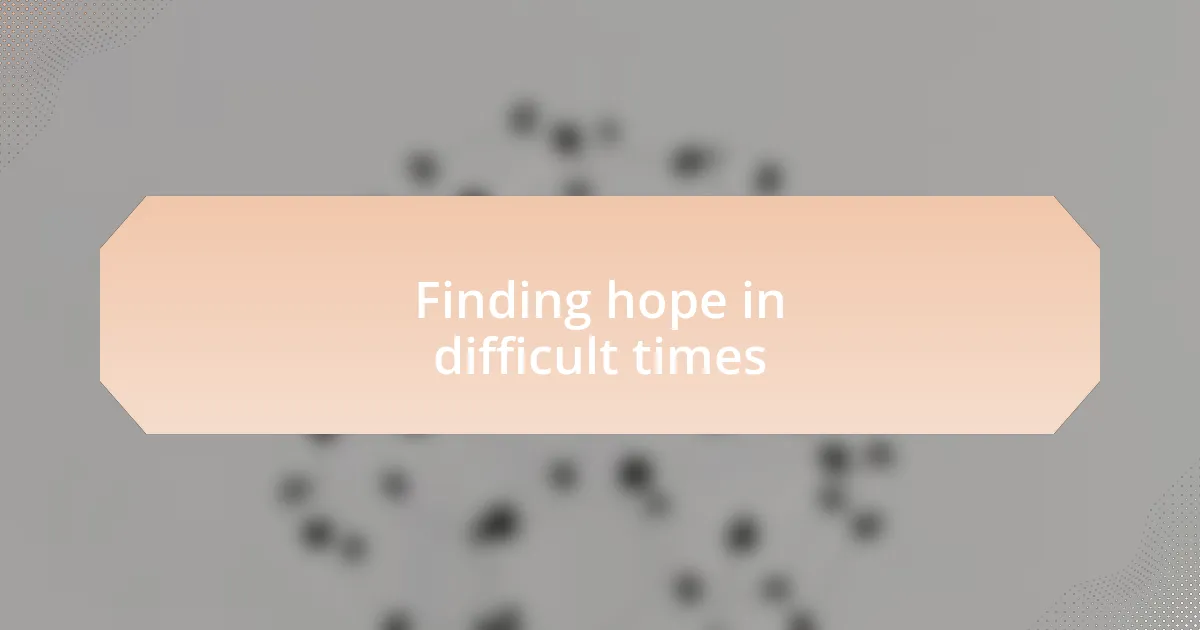
Finding hope in difficult times
Finding hope in difficult times can often feel elusive, especially when faced with the challenges of chronic illness. I remember sitting in my hospital bed, overwhelmed by pain and uncertainty, when a nurse stopped by and shared her own story of resilience. Her words carried a warmth that reminded me that hope doesn’t always come from grand gestures; sometimes, it’s found in the shared experiences of those around us. How often do we overlook the comfort in community during our hardest battles?
Another poignant moment was when I participated in a support group. Listening to others share their stories of struggle and triumph made my own journey feel a bit lighter. I watched as one woman spoke of her journey, tears glistening in her eyes, but there was also a fierce determination behind her words. In that room, I felt a surge of hope wash over me; was I not just a patient, but also part of a collective strength that could uplift us all?
I recall a day when I received a small handwritten note from a friend, filled with encouraging words. It was a simple reminder of my worth beyond my illness. Those little gestures can have such a profound impact. Have you ever experienced a moment so small, yet so powerful, that it reignited your sense of hope? In those instances, I learned that hope often emerges in the form of kindness, reaffirming that I am never truly alone in this journey.

Lessons learned from my journey
Throughout this journey, I’ve come to appreciate the power of patience. There were days when waiting for treatment results felt interminable. I discovered that embracing uncertainty not only taught me resilience but also allowed me to savor the small victories. Have you ever experienced the peace that comes from simply allowing things to unfold?
Another significant lesson I learned was the importance of self-advocacy. I remember a time when a new medication didn’t seem to be working, and I hesitated to bring it up. But when I finally spoke up during a consultation, the doctor adjusted my treatment plan, leading to improvements I didn’t think possible. Everyone’s journey is unique, and knowing how to voice my needs was like holding a compass in a storm.
The most profound insight was the realization that my worth is not defined by my illness. I now cherish moments with family and friends, where laughter shared creates an antidote to the struggles. Have you felt that sense of belonging, where your essence shines brighter than your challenges? This understanding has helped me nurture deeper connections, fostering joy beyond the shadows of illness.